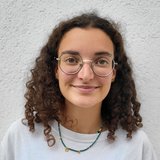
Aghayari, Avishan
Ellmeier LabMedical University of Vienna
Center for Pathophysiology, Infectiology and Immunology
Institute of Immunology - Division of Immunobiology
avishan.aghayari@meduniwien.ac.at
Avishan is a PhD student at the Institute of Immunology, Division of Immunobiology, at the Medical University of Vienna, under the supervision of Prof. Wilfried Ellmeier.
Her research focuses on uncovering novel mechanisms regulating CD4 cytotoxic T-cell (CD4 CTL) differentiation, with particular emphasis on epigenetic and transcriptional regulation. By employing CRISPR–Cas9 screening, she aims to identify key regulatory molecules and pathways that govern CD4 CTL differentiation, with the long-term goal of enabling the therapeutic induction of CD4 CTLs.
Prior to starting her PhD, Avishan completed a master’s degree in Bioengineering at the University of Tartu, where she investigated T-cell receptor repertoire changes in patients with common variable immunodeficiency following Comirnaty vaccination.

Bozic, Helena
Sakaguchi LabMedical University of Vienna
Center for Pathophysiology, Infectiology and Immunology
Institute of Immunology - Division of Immunobiology
helena.bozic@meduniwien.ac.at
Helena Bozic is a PhD student in the Institute of Immunology at the Medical University of Vienna, supervised by Shinya Sakaguchi.
Her research investigates how epigenetic changes influence T cell fate decisions in chronic infection and cancer. Using CRISPR-Cas9-mediated gene editing, mouse models, and multicolor flow cytometry, she strives to identify novel regulatory factors and elucidate the mechanisms driving T cell identity and function. Her work aims to reveal new therapeutic targets to modulate T cell responses, with potential applications in cancer immunotherapy and the treatment of chronic infections.
Before starting her PhD, Helena completed her master’s degree in molecular biology at the University of Vienna, where she worked on drug resistance of hepatocellular carcinoma.

Erharter, Lilly
Sibilia LabMedical University of Vienna
Center for Cancer Research
lilly.erharter@meduniwien.ac.at
Lilly Erharter is a PhD student at the Center for Cancer Research at the Medical University of Vienna, supervised by Prof. Maria Sibilia.
Using genetically engineered mouse models, murine tumor organoids, multi-omics profiling (RNA-seq, ATAC-seq, metabolomics), and advanced histopathological analysis, she aims to uncover how epigenetic and metabolic reprogramming of the liver microenvironment promotes metastatic seeding and immune evasion.
Before starting their PhD, Lilly completed a master’s degree in precision medicine at the University Grenoble Alpes. She previously worked on projects investigating methylation signaling and the intergenerational transmission of metabolic disorders induced by high-fat diets enriched in palmitic acid.

Fehringer, Michaela
Vogl LabMedical University of Vienna
Center for Cancer Research
michaela.fehringer@meduniwien.ac.at
Michaela Fehringer is a PhD student in the Center for Cancer Research at the Medical University of Vienna, supervised by Thomas Vogl.
Her research focuses on the pathogenesis of autoimmune rheumatic diseases such as rheumatoid arthritis or systemic lupus erythematosus by analyzing antibody responses against microbes (microbiota and pathogens) as well as self-antigens. While genetic predisposition is a well-established risk factor for these diseases, definite microbial triggers have not yet been identified – though accumulating literature indicates their role in pathogenesis.
To address this, Michaela applies Phage-display immunoprecipitation sequencing (PhIP-Seq), a high-throughput method that enables parallel screening of antibody responses against more than 600,000 antigens. This approach allows her to compare immune profiles of patients with those of healthy controls, and to track changes from pre-disease to disease states within the same individuals using population-scale cohorts. With access to a robotic platform in the Vogl laboratory, thousands of samples can be processed efficiently for a single disease, significantly advancing the discovery of microbial triggers and biomarkers.
Before starting her PhD, Michaela completed her master’s thesis at the Institut Pasteur in Paris, where she investigated the regulation of the IL-23 receptor, a key component of the IL-23/IL-17 pathway that plays a central role in many immune-mediated inflammatory diseases.

Gladkova, Marina
Bauer LabMedical University of Vienna
Center for Cancer Research
marina.gladkova@meduniwien.ac.at
Marina Gladkova is a PhD student at the Center of Cancer Research, Medical University of Vienna, supervised by Thomas Bauer.
Her research investigates the mechanisms of skin toxicities associated with targeted cancer therapies. By integrating patient data, genetically engineered mouse models (GEMMs), and multi-OMICS approaches, she aims to uncover how adverse skin effects following EGFR-targeted therapies and subsequent ERK pathway disruption drive cutaneous neuroinflammation and pruritic-like responses, with the ultimate goal of improving therapy efficiency and patient adherence. Marina was also elected Vice-President of the Young Scientist Association at the Medical University of Vienna for the 2025–2026 term.
Before beginning her PhD, Marina completed a joint BSc + MSc degree in Bioengineering and Bioinformatics at Lomonosov Moscow State University, where she worked on a project focusing on CRISPR-based therapies. From the early stages of her undergraduate studies, she participated in multidisciplinary projects related to ageing, gene therapies, regenerative medicine, and OMICS data analysis. She also gained professional experience in the biotech and pharmaceutical industry, including a position at Roche Moscow, and most recently focused on exploring the epigenetic landscape of cancers.

Gola, Deepika Kumari
Strobl LabUniversity of Veterinary Medicine Vienna
Department of Biomedical Sciences
deepika.gola@vetmeduni.ac.at
Deepika Gola is a PhD student at the Centre of Biological Sciences, University of Veterinary Medicine Vienna, supervised by Dr. Birgit Strobl.
Her doctoral research focuses on the role of TYK2 signaling in candidiasis. She uses mouse infection models, immunohistochemistry, FACS, qPCR, and host–pathogen interaction studies to test the efficacy of a TYK2 inhibitor in treating C. albicans skin infection. She also investigates the mechanistic pathway of TYK2 function in C. auris systemic infection.
Before her PhD, Deepika completed an MS in Biochemistry at TU Dresden. She did her thesis at the Max Planck Institute for Infection Biology, supervised by Dr. Marcus Taylor. Her thesis focused on investigating pharmacological strategies for targeting IRAK4 kinase in the Myddosome-dependent signaling pathway.

Hermann, Laura
Bonelli LabMedical University of Vienna
Department of Medicine III - Division of Rheumatology
laura.hermann@meduniwien.ac.at
Laura Hermann is a PhD student in the Department of Rheumatology at the Medical University of Vienna, supervised by Michael Bonelli.
Using a CD4+ T cell–based mouse model, she investigates how these cells contribute to disease pathogenesis, with the goal of identifying novel therapeutic targets for T cell–based treatments in autoimmune disorders.
Before starting her PhD, Laura completed her Master studies in the field of biomedicine at the Veterinary University of Vienna, where she worked on characterizing the tumor microenvironment of pancreatic and colorectal cancer-derived liver metastases.

Kaufmann, Helene
Barozzi LabMedical University of Vienna
Center for Cancer Research
helene.kaufmann@meduniwien.ac.at
Helene Kaufmann is a PhD student in the Center for Cancer Research at the Medical University of Vienna, supervised by Iros Barozzi.
In her project, she aims to uncover mechanisms that prevent spurious transcription of immune response genes in homeostatic macrophages, using machine learning-based approaches.
Before starting her PhD, Helene obtained a bachelor’s degree in Chemistry from the Technical University of Graz and a master’s degree in Drug Discovery and Development from the University of Vienna. For her final project, she spent a year at Leiden University, developing mathematical models of key pathways contributing to cellular senescence in liver tissue.

Kokkinogenis, Eleftherios
Sibilia LabMedical University of Vienna
Center for Cancer Research
eleftherios.kokkinogenis@meduniwien.ac.at
Eleftherios Panagiotis Kokkinogenis is a PhD student in the Center for Cancer Research at the Medical University of Vienna, supervised by Univ. Prof. Dr. Maria Sibilia, PhD.
His research investigates colorectal cancer KRAS-driven anti-EGFR therapy resistance through the tumor microenvironment. Using genetically engineered murine colorectal organoids and Cre transgenic mouse lines, he aims to elucidate the interplay between tumor KRAS mutations, the tumor microenvironment and the emergence of anti-EGFR therapy resistance in colorectal cancer.
Before starting their PhD, Eleftherios completed an integrated master’s degree in Applied Biology at the University of Ioannina in Greece and undertook his master’s thesis in the Biotech Research and Innovation Center of the University of Copenhagen in Denmark; where he worked on investigating the tumor-promoting potential of the RhoAE40Q hotspot mutation in head and neck squamous cell carcinoma cell lines.

Landau, Alina
Sibilia LabMedical University of Vienna
Center for Cancer Research
alina.landau@meduniwien.ac.at
Alina Daphne Landau is a PhD student at the Center for Cancer Research, Medical University of Vienna, under the supervision of Maria Sibilia.
Her research explores the role of type I interferons in shaping the tumor immune landscape. By combining genetically engineered mouse models, full-spectrum flow cytometry, multiplex immunohistochemistry, and transcriptomic analyses, she investigates how innate immunity and IFN-I signaling influence distinct tumor immune phenotypes. Her work aims to uncover mechanisms by which innate immune pathways can convert immunosuppressive tumors into more immunogenic states and to identify therapeutic strategies that enhance tumor immunogenicity.
Before beginning her PhD, Alina earned her master’s degree in Immunology at the University of Vienna, where she studied the impact of type I interferons on cancer immunity and progression, focusing on murine melanoma models.

Ribera Franco, Laia
Stary LabMedical University of Vienna
Department of Dermatology
laia.riberafranco@meduniwien.ac.at
Laia Ribera Franco is a PhD student in the Department of Dermatology at the Medical University of Vienna, supervised by Georg Stary.
Her research investigates the role of T cells in skin autoimmunity, with particular focus on cutaneous lupus erythematosus. Using patient-derived material, immunofluorescence, flow cytometry, and transcriptomic profiling, she dissects the contribution of distinct T cell subsets to disease initiation and progression. Her work aims to advance the mechanistic understanding of autoimmune responses in the skin and ultimately inform the development of targeted therapeutic strategies.
Before starting her PhD, Laia completed a master’s degree in medical biology at the University of Salzburg, where she investigated the influence of histone deacetylases (HDACs) on T cell differentiation and function in the context of skin autoimmunity.

Shen, Jiaqi
Knapp LabMedical University of Vienna
Department of Medicine I - Research Division Infection Biology
jiaqi.shen@meduniwien.ac.at
Jiaqi Shen is a PhD student in the Division of Infection Biology at the Medical University of Vienna, supervised by Sylvia Knapp.
His research focuses on how maternal immune activation (MIA) affects postnatal lung immune development and infection susceptibility. Using murine pneumonia models, flow cytometry, and transcriptomic profiling, he characterizes MIA-induced alterations in offspring immunity and explores maternal–fetal interactions. His work aims to uncover mechanisms by which maternal immunity shapes offspring immune development, informing pediatric immunology and guiding protective and therapeutic strategies for healthy immune maturation.
Before his PhD, Jiaqi completed a master’s degree in Infectious Diseases at the University of Edinburgh, where he studied how neutrophil dysfunction in liver cirrhosis increases susceptibility to bacterial infections.

Xiao, Yutian
Sibilia & Barozzi LabMedical University of Vienna
Center for Cancer Research
yutian.xiao@meduniwien.ac.at
Yu-Tian Xiao is a PhD student at the Center for Cancer Research, Medical University of Vienna, supervised by Maria Sibilia and Iros Barozzi.
His research investigates the tumor microenvironment and cancer therapeutic response. Using computational methods, his work aims to advance the understanding of tumor microenvironment and overcome treatment tolerance and resistance.